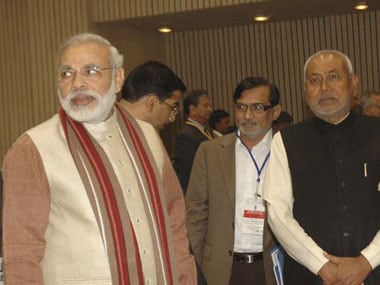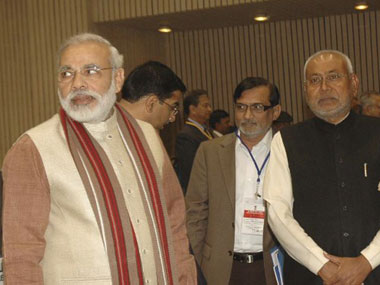It’s been a busy season for high-power divorces. Nearer home, too, political India is all aflutter about an imminent - and seemingly inevitable - parting of ways between the BJP and the JD(U), as political alignments are being reconfigured in the run-up to Election 2014. JD(U) leader Nitish Kumar has indicated that the talaq proclamation could come as early as on Sunday if the BJP doesn’t make the commitment he seeks. And what might that commitment be? A public proclamation from the BJP that Gujarat Chief Minister Narendra Modi, who was recently nominated his party’s election committee chairman, will not be made the party’s official candidate for prime ministership for Election 2014. And since it would be suicidal for the BJP to make such a proclamation, a divorce seems inevitable, although both parties are working overtime to avert such an outcome. But underlying all the backroom manoeuvres is a bit of political posturing on both sides, which seems utterly pointless in the current context. Yet, both parties seem incapable of breaking out of this mutually destructive pattern of behaviour or are persisting with it in the mistaken belief that they are protecting their political interest as well as they can. [caption id=“attachment_867891” align=“alignright” width=“380”]  Nitish Kumar’s political posturing centred around Modi’s persona is self-defeating. AFP.[/caption] In Nitish Kumar’s case, the posturing is rather more transparent. His party calculates that its political survival in Bihar hinges critically on its ability to garner the Muslim vote, and that that enterprise would be jeopardised if it were seen to be aligned with a BJP with Modi as its electoral mascot. That latter hypothesis hasn’t been conclusively validated - although political myth-making that passes for conventional wisdom has been claiming its veracity for years now. Which is why Nitish Kumar has for many months now been clamouring from the rooftops that he is ill-disposed to any effort to project Modi as the BJP’s prime ministerial candidate. But whereas his earlier articulations of concern were couched in generalities - only a “secular” leader, he had said, could be India’s prime minister - the gloves have come off in more recent times, and particularly after the Goa conclave of the BJP last fortnight, which made Modi the party’s campaign panel chairman. It’s true, of course, that Modi hasn’t formally been made the party’s candidate for prime ministership. After all, the BJP isn’t entirely convinced that it can afford to break free of the NDA shackles - and run on its own steam. But everything about the atmospherics at the Goa conclave validated the perception that Modi had in fact been made the de facto General of the BJP army. It is this that has prompted Nitish Kumar to move proactively to pre-empt any effort on the BJP’s part to make Modi the de jure candidate for prime ministerhip. On Friday, Nitish made his most forceful observation in this matter. In an interview to the Times of India, he said: “They (the BJP) will have to address our basic concern immediately and in public. Private assurances will not do.” As the report notes, while Nitish didn’t specifically invoke Modi’s name, there is no ambiguity about what he meant by “basic concern”. That statement also affords a clue to the kind of political posturing that the BJP is going through. It suggests that Nitish Kumar has in fact been receiving “private assurances” from the BJP that Modi would not be made the party’s prime ministerial candidate. That would seem to go against the grain of the public posturing by the party that Modi in fact will be its General. It also suggests that the party has not fully ironed out its internal differences on Modi’s ascent, even though it was able to effectively snuff out senior leader LK Advani’s public show of dissent centred around Modi’s elevation. In any case, all this political posturing - by the JD(U) and the BJP - is only a case of putting the cart before the horse. As I had noted earlier , the possibility of Modi becoming a serious contender for prime ministership arises only if the BJP secures in excess of 200 seats. That’s a big ask, but the party reckons that with Modi as its mascot and as a vote-multiplier, it can get there and perhaps even beyond. But if that calculation fails, and if the BJP secures only 150-160 seats on its own, there’s no earthly prospect of Modi becoming a candidate ever. And in fact, even Modi, for all his “searing ambition” wouldn’t be keen to inject himself as a candidate. In other words, for all the political posturing that’s going on now, it will be the arithmetic of the elections that will determine who the prime minister will be. If the BJP improbably secures 220 seats on its own, none of Nitish Kumar’s exertions can keep Modi from becoming Prime Minister, and in fact, even he might yield to the political inevitability. That a politically astute politician like Nitish Kumar should risk near-certain political defeat in Bihar - as happened in the recent byelection - by walking out of an alliance with the BJP unless it rules out Modi as its candidate is astonishing. Even from a realpolitik self-preservation consideration, it appears to be the worst of all possible words. But when you’ve spent a lifetime in political posturing, it is probably a habit that’s hard to break.
That a politically astute politician like Nitish Kumar should risk near-certain political defeat in Bihar by walking out of an alliance with the BJP unless it rules out Modi as its candidate is astonishing. But posturing is a habit that’s hard to break.
Advertisement
End of Article
Written by Vembu
Venky Vembu attained his first Fifteen Minutes of Fame in 1984, on the threshold of his career, when paparazzi pictures of him with Maneka Gandhi were splashed in the world media under the mischievous tag ‘International Affairs’. But that’s a story he’s saving up for his memoirs… Over 25 years, Venky worked in The Indian Express, Frontline newsmagazine, Outlook Money and DNA, before joining FirstPost ahead of its launch. Additionally, he has been published, at various times, in, among other publications, The Times of India, Hindustan Times, Outlook, and Outlook Traveller. see more


)
)
)
)
)
)
)
)
)



